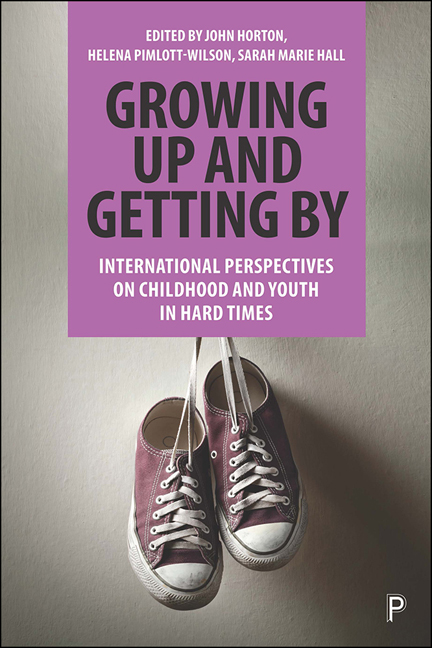17 - Conclusions and futures
Published online by Cambridge University Press: 18 December 2021
Summary
Introduction
Children, young people and families in hard times
This book set out to illuminate the personal, everyday effects of hard times for children, young people and families in diverse global contexts. In this concluding chapter, we begin by outlining the contribution of the three Parts of the book and their constituent chapters to our understanding of the hard times which interlace with the lives of children, youth and families. Our focus on ‘hard times’ aims to shed light on all manner of structural inequalities, longstanding exclusions and power imbalances which are being constituted or intensified by neoliberalisations, austerities and economic crises. Elucidating the implications of these complexly relational, hurtful and deeply affecting moments leads us to reflect on the opportunities and prospects for socially-differentiated children and young people getting by and growing up in hard times. In bringing together neoliberalisations, austerities and economic crises, we recognise how these processes are lumped together, materially and spatially (Katz, 2004; 2018) and in people's everyday experiences. Drawing the collection to a close, we consider further directions for research which is sensitive to the interrelations between broadscale political-economic shifts and locally-scaled, personally inflected inequalities.
Examining hard times: a collection
Divided into three key Parts, the collection began with an exploration of the transformative impacts of hard times for children, youth and families at the sharp end of neoliberalisms, austerities and economic crises. Drawing on work from diverse international contexts, Part 1 explored the transformations which play out unevenly at personal, familial and local scales as a result of political-economic processes. The chapters detail how hard times impinge on the discursive norms and deeply-rooted social inequalities which pervade the lives of children, youth and families. In Part 2 of the book, our contributors sketch out the ways in which the contours of hard times intersect with axes of social difference to produce new or intensified forms of poverty and inequality. The chapters outline how alongside experiences of precarity and marginalisation, social ties and moral responsibilities are being refashioned, moderated or entrenched in the lives of children, youth and families. Heteropatriarchal familial norms, intergenerational obligations, discourses of normative childhoods and politics of poverty coalesce with marginality and inequalities, constituting variegated experiences of hard times.
- Type
- Chapter
- Information
- Growing Up and Getting By , pp. 329 - 344Publisher: Bristol University PressPrint publication year: 2021

